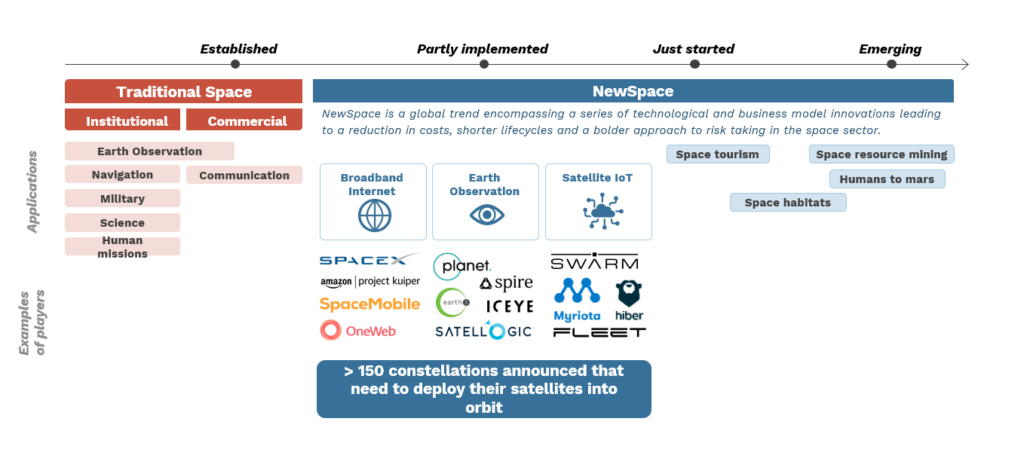Small satellites and their demand for dedicated services
The global space market today is estimated to be in the range of EUR 400 billion. A large percentage of this market is driven by services, such as satellite communications, Earth observation, and Positioning Timing and Navigation (PNT). These sectors are currently being disrupted by private players who see commercial opportunities arising from the demand for a more connected world and who have identified the value of Earth observation data in their decision-making processes. Constellations of small satellites in Low Earth Orbit (LEO) are the icons of this movement, known as NewSpace.
The rise of constellations for broadband connectivity and the Internet of Things (IoT), as well as various optical, multispectral, and synthetic aperture radar (SAR) constellations are leading to an exponential growth of the number of satellites to be launched. These constellations have already attracted numerous players from IT and big data with financial backing from Venture Capital (VC) and Private Equity (PE) funds.
Currently, more than 150 satellite constellations have been announced. Out of these, roughly a third have at least one satellite already in orbit, while most of the remaining ones are under development. The initial launch of these satellite constellations and their replenishment are sure to create and sustain significant demand for launch services.

Unique launch requirements of small satellites
Small satellites below 200 kg will generate a launch demand of more than 200 tonnes by 2030. However, these satellites require additional launch services compared to the traditional ridesharing model on large launch vehicles. Constellation operators are also looking for on-demand launch services to their desired orbit at the desired time, and/or target replacement of individual satellites. Luckily, these needs can be met by micro-launchers. By facilitating these services, micro-launchers and satellite constellations go hand-in-hand, creating a flourishing ecosystem of mutual growth. Micro-launchers are currently being designed and built worldwide to provide prospective NewSpace clients with novel access to space, meeting their specific cost, launch flexibility and scheduling needs.

The growing micro-launcher market and its enabling technologies
There are currently more than 100 micro-launchers being developed, yet only a few are operational. Rocket Lab was the first company to focus on developing commercial micro-launchers and provide frequent and dedicated access to space for small satellites. The sector is constantly evolving in response to innovation such as hybrid propulsion (Hyimpulse, Gilmour, Innospace), electrically driven turbopumps (e.g., Rocket Lab), reusability (e.g., ArianeGroup’s Maia Space) and even ground-based, electric-powered kinetic launch systems (SpinLaunch). Recent special purpose acquisition company (SPAC) deals and financing rounds from large investment management corporations such as Blackrock and Earlybird underline the huge interest from investors.
Micro-launchers are also gaining huge popularity in Europe, enabling independent access to space. Currently, there are dozens of start-ups and established companies aiming to capture the small satellite launch market. Isar Aerospace, Hyimpulse, Rocket Factory Augsburg, Maia Space (a subsidiary of Ariane group), Orbex, PLD Space, Skyrora all aim to perform their maiden flights in 2022 or in the coming years. Such a large number of micro-launchers targeting a growing yet niche market will result in fierce competition. In order to survive this competitive landscape, commercial micro-launcher companies require a solid business strategy backed by market forecasts and intelligence.
Novaspace has extensive experience working with clients such as the European Commission, DG DEFIS, EUSPA, national governments, space agencies as well as commercial aerospace companies around the world to provide market analyses as well as market-entry and growth strategies. Reach out to us for more information about the micro-launcher market, strategy development and business modelling/planning.